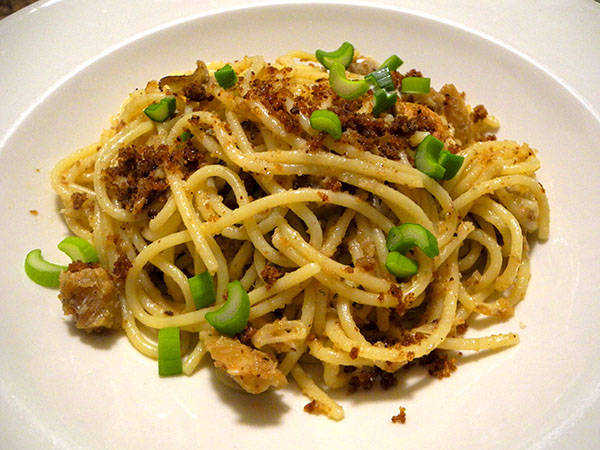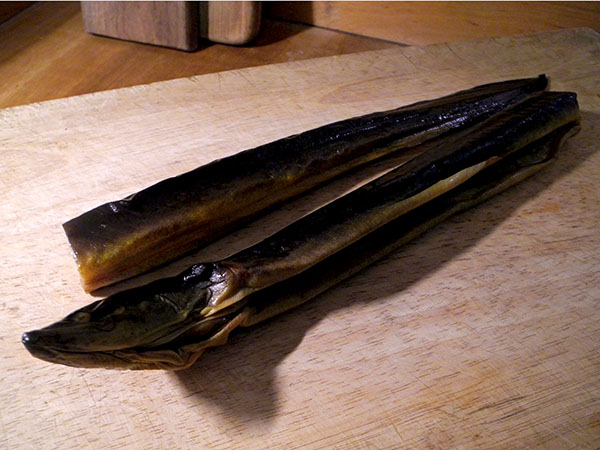
Like all non-farmed fish, it’s essentially ‘game’, but unlike almost any other fish, it’s actually not ‘fishy’ at all.
We love eel, fresh or smoked. We are therefore always very grateful to the folks who are willing to go through the, literally, heroics of cleaning these magnificent creatures. With smoked eel however, the worst of the process, removing the very slippery skin, can be skipped, the consumers themselves inheriting the responsibility, made much easier after its surfaces have been tamed in the smoke oven.
The image below is of a single one-pound smoked eastern Long Island eel, displaying a beautiful green/gold sheen on our kitchen counter, after it had been removed from the vacuum packaging where it had lain, cut crosswise for convenience.

-
two large cloves of garlic from Tamarack Hollow Farm, sliced thinly, heated in a deep enameled cast iron pan over medium-high flame, along with one dried whole hot pepper, peperoncino Calabresi secchi, from Buon Italia, and a bit of crushed, dark, home-dried heatless Habanada pepper (acquired fresh from Norwich Meadows Farm last summer), until the garlic was almost starting to color, pieces of one skinned and boned smoked local eel from P.E. & D.D. Seafood added and stirred until warmed through, half of the amount of savory pangrattato* which had been prepared earlier mixed in and combined, the cooked and drained pasta (18 ounces of Afeltra Spaghetto from Eataly), added to the pan, tossed with the eel and pangrattato and stirred over low heat for a couple of minutes, adding more than a cup of the reserved pasta water while doing so to keep the mix moist, which was then served in low bowls, where it was sprinkled with more pangrattato and finished with most of one sliced spring onion from Norwich Meadows Farm
*The pangrattato was prepared by adding about a third of a cup of homemade breadcrumbs to about a fourth of a cup of olive oil in which more thinly-sliced Tamarack Hollow garlic cloves and 3 anchovies from Buon Italia had been heated for a short while, and, after being stirred for 4 or 5 minutes, the mixture was then drained on paper toweling and brought to room temperature
- the wine was an Italian (Marche) white, Fattoria Laila Verdicchio dei Castelli di Jesi Classico Superiore 2015
- the music was the second half of the 1975 Philip Glass/Robert Wilson opera, ‘Einstein On The Beach’, in a new recording with Michael Riesman conducting the Philip Glass Ensemble, the complete list of performers included on the ArkivMusic page